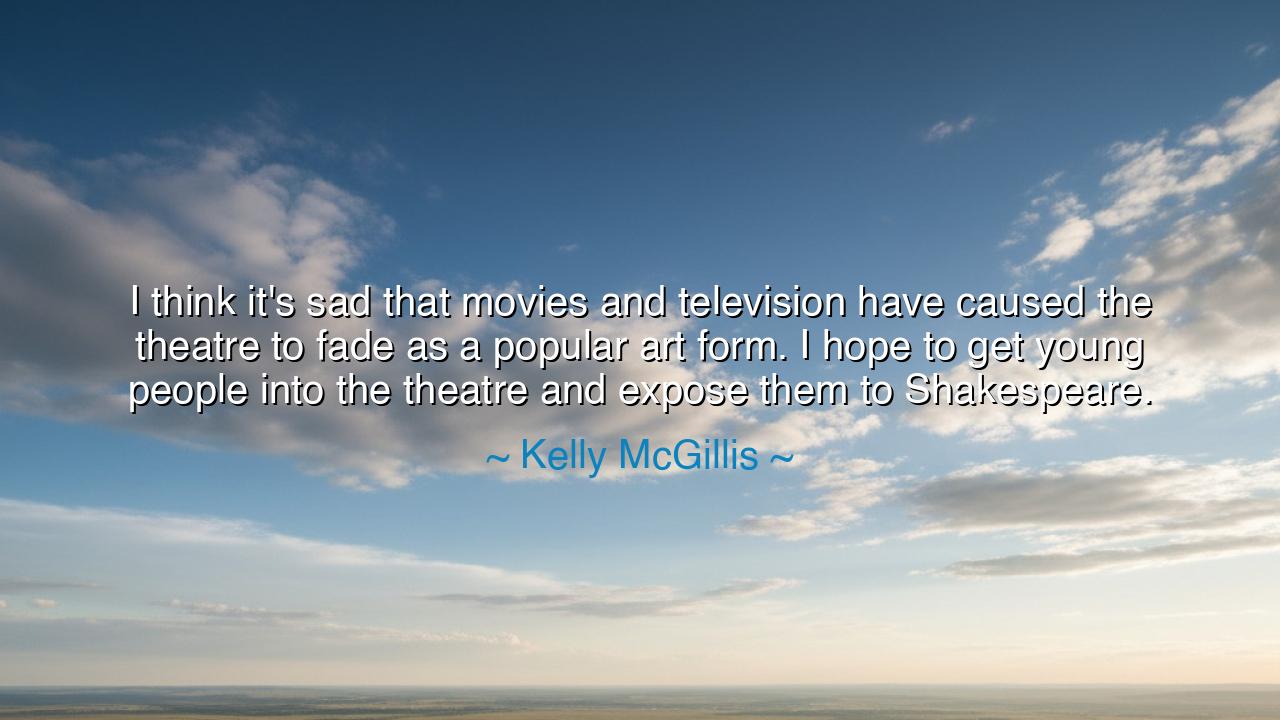
I think it's sad that movies and television have caused the
I think it's sad that movies and television have caused the theatre to fade as a popular art form. I hope to get young people into the theatre and expose them to Shakespeare.






There are art forms whose light has illuminated the human soul for centuries, yet which can fade when newer spectacles claim the attention of the masses. Kelly McGillis laments this when she says, “I think it's sad that movies and television have caused the theatre to fade as a popular art form. I hope to get young people into the theatre and expose them to Shakespeare.” In these words lies the profound sorrow of one who witnesses the quiet decline of a medium that nurtures empathy, imagination, and critical reflection. For theatre is not merely performance—it is a living dialogue between audience and actor, a mirror of the human condition.
The decline McGillis speaks of is not a loss of entertainment, but of an ancient communion. Theatre, from the amphitheaters of Greece to the stages of Renaissance England, was a public forum for learning, contemplation, and catharsis. Socrates and Aristophanes understood the stage as a place where moral questions could be explored openly, where citizens were invited to think, feel, and engage. Shakespeare, whose works McGillis hopes to impart to youth, continues this tradition, offering narratives that dissect the depths of ambition, love, jealousy, and fate. In forgetting theatre, society risks losing the space where intellect and emotion are simultaneously exercised.
Movies and television, while powerful in their own right, offer a passive consumption of art, often designed for convenience rather than reflection. The theatre requires active engagement: one must listen, interpret, imagine, and respond. McGillis’ sorrow stems from this very contrast—the ephemeral click of the remote replacing the rich, shared experience of a crowded hall, where every gesture and spoken line vibrates with immediacy. In this loss, there is a diminishment of human connection, for theatre’s magic lies not just in story, but in the shared presence of those who watch and perform.
Her desire to draw young people into theatre is a call to revival, a plea to preserve not only the art itself but the values it fosters. To introduce youth to Shakespeare is to provide them a lens through which to examine human nature across centuries. Consider the story of Orson Welles, whose early immersion in theatre shaped his later cinematic genius. Welles carried the lessons of stagecraft into film, showing how understanding performance, timing, and human psychology on stage can enrich storytelling in every medium. By exposing young minds to theatre, McGillis seeks to plant seeds that will bear fruit in creativity, empathy, and critical thinking.
Shakespeare, in particular, embodies the enduring wisdom of the stage. His plays traverse the spectrum of human experience, from comedy to tragedy, from political intrigue to intimate reflection. Through characters like Hamlet, Othello, and Portia, audiences encounter the complexities of morality, love, and ambition. To bring youth to these works is not simply to entertain—it is to educate, to immerse them in moral and intellectual challenges, and to cultivate their capacity for empathy and understanding. Theatre becomes a gymnasium for the soul, sharpening perception as much as imagination.
McGillis’ reflection also teaches that cultural preservation requires effort and advocacy. Art forms do not survive on their own—they are sustained by those willing to champion them, to inspire interest, and to make them accessible. The fading of theatre is not inevitable; it can be reversed by educators, performers, and audiences who understand its irreplaceable value. By acting as a guide and ambassador, McGillis embodies the timeless principle that art must be passed from one generation to the next, nurtured with care and dedication.
From her words, we draw a clear lesson: engage with the arts actively and intentionally, and encourage others to do the same. Seek out the theatre, read the classics, and experience the live performance of human emotion and intellect. Recognize that art is not merely diversion, but a tool for reflection, growth, and connection. The theatre, ancient and enduring, invites us to participate fully, to witness the world’s beauty and tragedy, and to emerge transformed.
Thus, let Kelly McGillis’ vision guide us: in a world increasingly mediated by screens, let us preserve the vitality of the stage. Introduce youth to Shakespeare and the wonders of theatre, not simply to observe, but to feel, question, and learn. For in every play performed and every audience engaged lies the hope that the art of theatre will continue to illuminate minds and hearts, teaching us, as it has for centuries, what it means to be fully, profoundly human.






AAdministratorAdministrator
Welcome, honored guests. Please leave a comment, we will respond soon